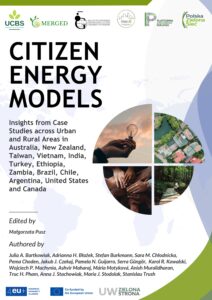 We present a report written by students of the Sustainable Development and Global Environmnet and Development (MERGED) – both degree programs are coordinated by the University’s Center for Environmental Studies and Sustainable Development, in cooperation with the Contributing Departments.
We present a report written by students of the Sustainable Development and Global Environmnet and Development (MERGED) – both degree programs are coordinated by the University’s Center for Environmental Studies and Sustainable Development, in cooperation with the Contributing Departments.
Learn more about the Global Environmnet and Development (MERGED) and Sustainable Development studies here and here.
This report is the culmination of the Challenges of the Social Dimension of Sustainability course taught by Małgorzata Pusz Ph.D of the Urban Research Lab (UrbanLab WGSR UW), a scientific unit at the Faculty of Geography and Regional Studies (WGSR) at the University of Warsaw.
Citizen energy is a model in which residents and local communities take an active role in the generation, distribution and consumption of energy, often using renewable sources. These models are rooted in the ideas of community involvement, decentralization, democratization, local empowerment and reinvestment of profits. They represent a form of energy democracy, a concept that emphasizes shifting the balance of power in the energy industry from corporations to citizens and from fossil fuels to renewable alternatives.
